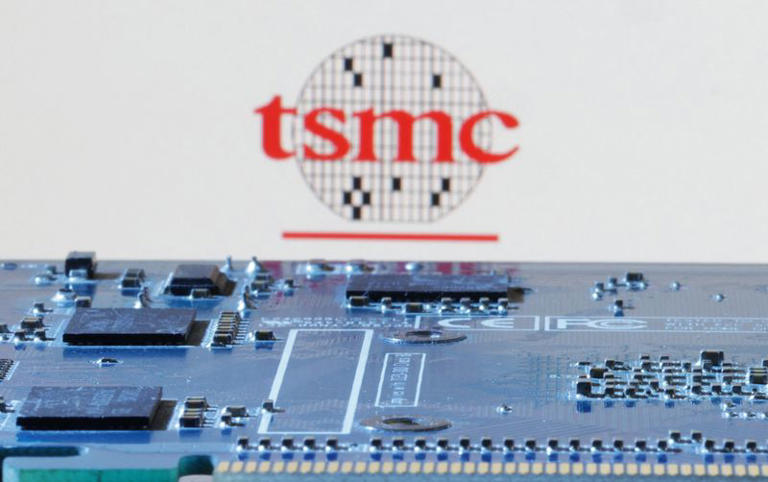On Wednesday, the Asian chipmaking sector faced a notable downturn driven by profit-taking activities ahead of eagerly anticipated earnings reports from industry giants ASML Holding NV and TSMC. ASML, a prominent Dutch manufacturer of lithographic equipment essential for semiconductor production, reported robust net bookings for the second quarter, surpassing market expectations. This performance was particularly fueled by heightened demand from the artificial intelligence (AI) sector, underscoring the industry’s pivotal role in supporting technological advancements.
ASML’s positive earnings signaled optimism within the chipmaking industry, where companies like ASML and Taiwan Semiconductor Manufacturing Company (TSMC) are considered key indicators of market trends and economic health. Investors initially responded favorably to ASML’s results, viewing them as a promising precursor to TSMC’s upcoming earnings report, scheduled for the following day.
However, amidst the optimism, caution prevailed across Asian markets as investors awaited TSMC’s financial results. Monthly revenue data had already hinted at strong performance for TSMC in the second quarter, driven by sustained demand for chips used in AI applications and other advanced technologies. Despite these positive indicators, concerns lingered regarding the sustainability of chip demand and the potential impacts of recent market volatility.
In Japan, Tokyo Electron Ltd., the country’s foremost chipmaker, saw its shares decline sharply by 7.5% amid broader market sell-offs. Similarly, Advantest Corp. and Renesas Electronics Corp., key players in Japan’s semiconductor industry, experienced losses of 2.5% and 1.3%, respectively. The market sentiment in Japan reflected broader uncertainties about future demand and profitability in the global chip sector.
South Korean chipmakers also faced significant declines, with SK Hynix Inc. and Samsung Electronics Co Ltd. reporting drops of 4.3% and 0.8%, respectively. Both companies play critical roles in the memory chip market, which has been volatile due to fluctuating demand and competitive pressures.
In China, Semiconductor Manufacturing International Corp. (SMIC), the largest chipmaker in the country, registered a decline of approximately 1%. The Chinese semiconductor sector, while growing rapidly, is also subject to geopolitical tensions and global market dynamics that impact investor sentiment and stock performance.
Beyond market factors, geopolitical developments added to the cautious atmosphere. Comments by U.S. Republican presidential candidate Donald Trump, suggesting Taiwan should increase its financial contributions towards U.S. defense supplies, exacerbated concerns about stability in Taiwan, a pivotal hub for global chip manufacturing. Any disruptions in Taiwan could potentially ripple through the semiconductor supply chain, affecting production and supply globally.
Overall, while ASML’s strong earnings provided a temporary boost, the Asian chipmaking sector remains sensitive to a complex interplay of economic, technological, and geopolitical factors. The upcoming earnings report from TSMC and ongoing developments in global markets will likely continue to shape investor sentiment and market dynamics in the semiconductor industry.
On Wednesday, the Asian chipmaking sector faced a notable downturn driven by profit-taking activities ahead of eagerly anticipated earnings reports from industry giants ASML Holding NV and TSMC. ASML, a prominent Dutch manufacturer of lithographic equipment essential for semiconductor production, reported robust net bookings for the second quarter, surpassing market expectations. This performance was particularly fueled by heightened demand from the artificial intelligence (AI) sector, underscoring the industry’s pivotal role in supporting technological advancements.
ASML’s positive earnings signaled optimism within the chipmaking industry, where companies like ASML and Taiwan Semiconductor Manufacturing Company (TSMC) are considered key indicators of market trends and economic health. Investors initially responded favorably to ASML’s results, viewing them as a promising precursor to TSMC’s upcoming earnings report, scheduled for the following day.
However, amidst the optimism, caution prevailed across Asian markets as investors awaited TSMC’s financial results. Monthly revenue data had already hinted at strong performance for TSMC in the second quarter, driven by sustained demand for chips used in AI applications and other advanced technologies. Despite these positive indicators, concerns lingered regarding the sustainability of chip demand and the potential impacts of recent market volatility.
In Japan, Tokyo Electron Ltd., the country’s foremost chipmaker, saw its shares decline sharply by 7.5% amid broader market sell-offs. Similarly, Advantest Corp. and Renesas Electronics Corp., key players in Japan’s semiconductor industry, experienced losses of 2.5% and 1.3%, respectively. The market sentiment in Japan reflected broader uncertainties about future demand and profitability in the global chip sector.
South Korean chipmakers also faced significant declines, with SK Hynix Inc. and Samsung Electronics Co Ltd. reporting drops of 4.3% and 0.8%, respectively. Both companies play critical roles in the memory chip market, which has been volatile due to fluctuating demand and competitive pressures.
In China, Semiconductor Manufacturing International Corp. (SMIC), the largest chipmaker in the country, registered a decline of approximately 1%. The Chinese semiconductor sector, while growing rapidly, is also subject to geopolitical tensions and global market dynamics that impact investor sentiment and stock performance.
Beyond market factors, geopolitical developments added to the cautious atmosphere. Comments by U.S. Republican presidential candidate Donald Trump, suggesting Taiwan should increase its financial contributions towards U.S. defense supplies, exacerbated concerns about stability in Taiwan, a pivotal hub for global chip manufacturing. Any disruptions in Taiwan could potentially ripple through the semiconductor supply chain, affecting production and supply globally.
Overall, while ASML’s strong earnings provided a temporary boost, the Asian chipmaking sector remains sensitive to a complex interplay of economic, technological, and geopolitical factors. The upcoming earnings report from TSMC and ongoing developments in global markets will likely continue to shape investor sentiment and market dynamics in the semiconductor industry.
